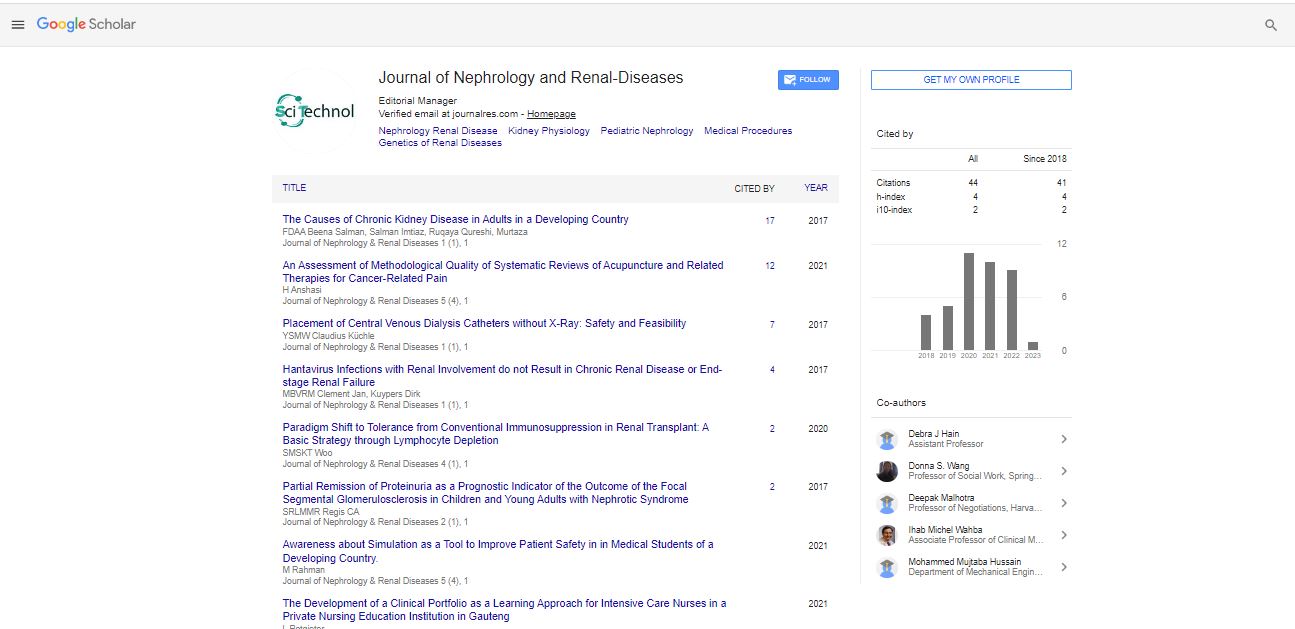Perspective, J Nephrol Ren Dis Vol: 7 Issue: 2
Decoding Immune-Kidney Collaboration through Renal Immunology
Candice Marcin*
Department of Medicine, Western University, London, Ontario, Canada
*Corresponding Author: Candice Marcin,
Department of Medicine, Western
University, London, Ontario, Canada
E-mail: candmarc@wul.on.ca
Received date: 22 May, 2023, Manuscript No. JNRD-23-107005;
Editor assigned date: 25 May, 2023, PreQC No. JNRD-23-107005 (PQ);
Reviewed date: 08 June, 2023, QC No. JNRD-23-107005;
Revised date: 15 June, 2023, Manuscript No. JNRD-23-107005 (R);
Published date: 22 June, 2023, DOI: 10.4172/2576-3962.1000033
Citation: Marcin C (2023) Decoding Immune-Kidney Collaboration through Renal Immunology. J Nephrol Ren Dis 7:2.
Description
Renal immunology explores the intricate relationship between the immune system and the kidneys, highlighting the role of immune responses in both maintaining renal health and contributing to kidney diseases. Understanding renal immunology is important for unraveling the pathogenesis of renal disorders and developing targeted interventions for improved patient outcomes.
The kidneys are not only important for their excretory functions but also serve as a dynamic immunological organ. Renal immunology focuses on the immune-mediated processes occurring within the kidneys, involving various immune cells, cytokines, chemokines and other immunological components. These interactions are essential for maintaining immune homeostasis and tissue integrity.
The kidneys contain several immunological components that play key roles in immune surveillance and immune responses. Renal resident cells, such as mesangial cells, endothelial cells and tubular epithelial cells, can act as antigen-presenting cells, participating in both innate and adaptive immune responses. Additionally, the interstitium of the kidneys immune cells, including macrophages, dendritic cells, T cells, B cells and natural killer cells, which collectively contribute to immune regulation and immune-mediated renal processes.
The kidneys employ intricate mechanisms to regulate immune responses and maintain tissue homeostasis. Renal resident cells express a variety of immune regulatory molecules, including complement regulatory proteins, adhesion molecules and cytokines, to modulate immune cell trafficking and activation within renal tissues. Immune cells, in turn, can infiltrate the kidneys in response to inflammatory signals and participate in immune-mediated processes such as immune surveillance, antigen recognition, cytokine secretion and tissue remodeling.
Immunological dysregulation can lead to a spectrum of immunemediated renal diseases. Glomerulonephritis encompasses a group of disorders characterized by immune complex deposition, complement activation and inflammation within the glomeruli. Immune-mediated tubulointerstitial nephritis involves cellular infiltrates, cytokine release and tubular injury. Autoimmune kidney diseases, such as lupus nephritis or anti-glomerular basement membrane disease, result from aberrant immune responses targeting renal antigens. Understanding the underlying immunopathogenesis is important for appropriate diagnosis and targeted management of these renal disorders.
Advancements in renal immunology have paved the way for therapeutic interventions targeting the immune system. Immunomodulatory strategies, such as glucocorticoids, immunosuppressive agents (e.g., calcineurin inhibitors, mycophenolate mofetil) and biologic agents (e.g., monoclonal antibodies targeting specific immune cell subsets or cytokines), are employed to modulate immune responses in immune-mediated renal diseases. These therapies aim to suppress aberrant immune activation, attenuate inflammation and preserve renal function.
Renal immunology continues to evolve, with emerging analysis shedding light on novel aspects of immune regulation and immunemediated renal diseases. Recent analysis has underlined the importance of the gut-kidney axis in renal health and disease, exploring the impact of intestinal microbiota on renal immune responses. Additionally, the concept of immune senescence and immunometabolism is gaining attention in the context of renal aging and age-related renal diseases. Further investigation into these areas may provide valuable insights into disease pathogenesis and novel therapeutic targets.
Conclusion
Renal immunology is a complex and dynamic field that investigates the intricate interplay between the immune system and kidney function. Understanding renal immunology is important for unraveling the pathogenesis of immune-mediated renal diseases and developing targeted interventions to modulate immune responses and preserve renal health. Ongoing analysis in renal immunology will continue to advance the knowledge, leading to improved diagnostic techniques, more precise therapeutic strategies and ultimately better outcomes for patients with immune-mediated renal diseases.
 Spanish
Spanish  Chinese
Chinese  Russian
Russian  German
German  French
French  Japanese
Japanese  Portuguese
Portuguese  Hindi
Hindi 
